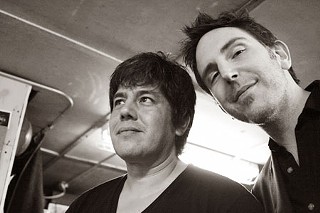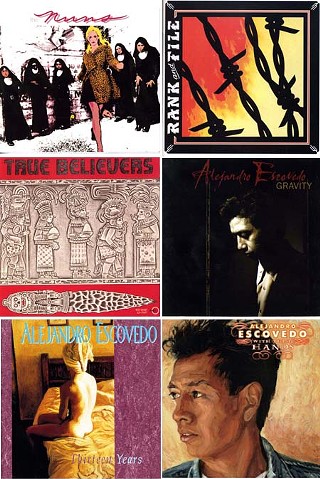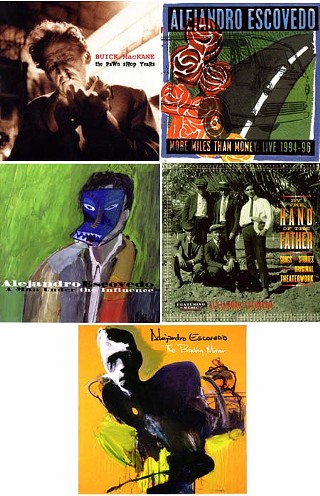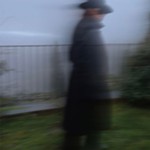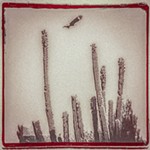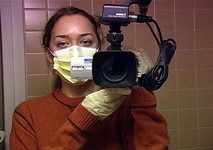Fantastic Journey
Alejandro Escovedo retraces his steps
By Dave Marsh, Fri., June 20, 2008
For the last 16 years, Alejandro Escovedo has been one of America's two or three greatest popular music artists, but if you just moved to Austin, you probably don't know it. If you live somewhere else and know the longtime local, perhaps it's because you saw the YouTube video of him performing "Always a Friend" with Bruce Springsteen & the E Street Band, April 14 in Houston. Maybe you were a subscriber to the late, great No Depression, the roots-music bible that in 1998 named him Artist of the Decade. They got it right.
It's almost funny Escovedo became more prominent singing one song at the Toyota Center arena than he did in 15 years of playing some of the most thrilling shows anywhere. I've seen him solo in a room with 20 people, as a duo with another guitar or a violin, with the scabrous glam rock band Buick MacKane, and with the Alejandro Escovedo Orchestra. I've dragged people by the ear to see him at midnight simply by saying, "Other than Bruce, he's the best live artist I know." I got it right, too.
Real Animal, his ninth release, is his Born to Run, the album that justifies every superlative ever thrown at him, and it does so by retracing his journey from Orange County, Calif., where he grew up, to Los Angeles, San Francisco, and New York. The focus centers on the music he loved and the life he lived before arriving in Austin in the early 1980s. It's not a throwback to other bands he's played with or led, Rank and File, the True Believers, and Ronnie Lane's last Slim Chance. Rather, it's a throwback to the music of the Stones, Bowie, T. Rex, the Stooges, and all the other rock bands that inspired him. It was even produced by Tony Visconti, who made all those great Bowie and T. Rex records.
(Starting with this album, my wife, Barbara Carr, began managing Escovedo, which has nothing to do with me, other than it's my pleasure to report it. She and her partner, Jon Landau, also manage Bruce Springsteen, as they have since 1980. If I weren't married to Barbara, what I'd do is toss in a few superlatives about how great it is that Escovedo has such prominent, empathetic, and professional management.)
The new disc is the second Escovedo effort to appear on Back Porch, a division of major label EMI, not a milestone most great performers have to wait until they're in their 50s to achieve. Like the man says in "Chelsea Hotel '78," his new song about living in the legendary New York City bohemian hotel at the same time that Sid and Nancy were getting themselves dead there: "It makes perfect sense (it makes no sense). It makes no sense (it makes perfect sense)."
One reason Real Animal is so much better is that Escovedo's superb instinct for finding the right collaborators kicked into overdrive for this project. Even before EMI's Ian Ralfini hooked him up with Visconti, he had begun songwriting with fellow roots-rockist Chuck Prophet. Eventually, they'd write every song on the album together.
"Chuck was a perfect foil, because he had grown up in Orange County," explains Escovedo. "He knew the culture. He was also a surfer. He understood all of that stuff."
The payoff comes in a song like "Swallows of San Juan," a latter-day "Surf's Up." The surfers "crawl up on the shore, roll in the mud and the clay," and behind them the surf is "breaking bigger and harder than anyone's ever seen." It's a song about going back, except you can't. You can't stop trying either.
"For us, it was wanting to roll around in the music. The source, right?" said Escovedo in early May, when we talked at the Sirius Satellite Radio studios in New York. "The metaphor being the swallows would always build these beautiful mud nests. They would also always come home to this beautiful mission. It was gorgeous. We always went there as kids, in elementary school, on field trips to the San Juan Capistrano Mission.
"My parents would also take all our relatives that would come to visit there because it was so beautiful. I remember it came to represent everything that was beautiful about Southern California at the time. So now, of course, there aren't as many swallows coming back. ...
"[The song] was just about really wanting to get back and roll around in it again. Just roll around in the mud. It's kind of Darwinian, I guess, very much about that primitive, that primal scene."
"Swallows" is a slow song – not a ballad in any other sense – but there are plenty of hard-rocking parallels on Real Animal, notably the title cut, an anthemic tribute to Iggy Pop and his Stooges (but mostly Iggy). One smart decision was using Escovedo's road band. It's an odd assortment for a guy who declares at the beginning of one new song, "All I ever wanted was a fourpiece band." If you don't expect that to mean guitar, bass, drums, and strings, you don't know Alejandro Escovedo's music. These are essential collaborators.
He's worked with drummer Hector Muñoz, who plays like a mighty beat beast throughout Real Animal, for 25 years; violinist Susan Voelz for about 20; Brian Standefer, the cellist, for 13; guitarist David Pulkingham, with whom he does live gigs when he's playing acoustic, for six. Bassist Josh Gravelin, formerly of Cotton Mather, is the newcomer. Prophet was until lately the other guitarist. He departed to fulfill commitments to his well-trenched solo career.
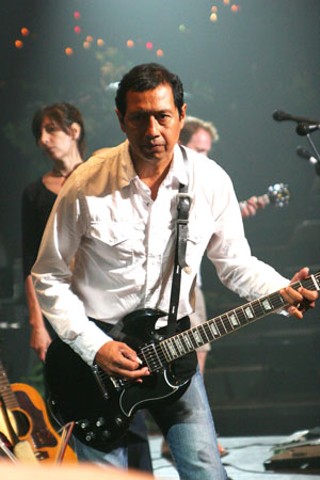
Real Animal is "the first record in which the band has been involved in the creation of the whole project," affirms Escovedo. "And I mean from the very first. The first song we wrote together was a song called 'Slow Down,' which closes the album. I think it was two days later, maybe that very night, that I took it to the band. We were playing Antone's, and we ran through it at sound check, and we played it that night. We had a lot of gigs going on at that time, so all these songs, as they were coming, we were playing them the very same night that they were written. It was a year in writing the record. By the time we prepared to make it, we had been playing these songs for over a year."
This is where Tony Visconti's skills really came into play. The album's virtually live. Moreover, Visconti's also a terrific arranger and can do charts on the spot, thanks to his handy song flute.
"To work with Tony Visconti was a dream come true, really," says Escovedo. "Not only because of the Bowie and T. Rex records but the way he used strings on those records. I hope I'm not giving away any of his secrets, but he carries a recorder with him all the time, the kind you have in elementary school. So as he's listening to these tracks being played, he's suddenly coming up with a melody figure. Like 'Hollywood Hills,' let's say.
"He's playing it on his recorder, and then he writes out these perfect charts for a string quartet. And they're very well-written. He hands them out to the strings, and they go over it a couple of times, and it's done, and there you have it. It's an all-in-one thing with Tony."
He pauses. Escovedo often speaks most softly when making his most passionate statements. He does that this time.
"Not only is Tony qualified with all these talents, he's a wonderful human being, too. So it was a pleasure, a real pleasure."
Except for a few tracks on 1998 live compilation More Miles Than Money, no other Escovedo album comes as close to the full spectrum of music he generates onstage as does Real Animal. The basic mode is classic rock, but only if your version of classic rock includes the Stooges and strings. What it most reminds me of is the Stones' Sticky Fingers, with lyrics by Pete Townshend, although it's been a very long time since even Townshend wrote these kinds of confessional narratives. The opening bars of "Sister Lost Soul," which is blatant Phil Spector, find Hector Muñoz getting closer to the heart of the opening beats of "Be My Baby" than anyone I've ever heard.
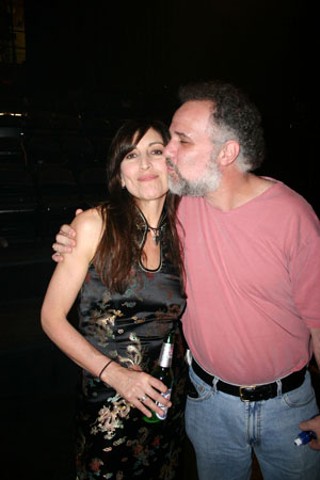
We're not talking concept album, exactly, much less rock opera. Not all the songs relate to the theme. "Sister Lost Soul," arguably the musical heart of the album – its "Sway" – doesn't. There's a trio of songs, for instance, addressing the world to which his parents moved him from San Antonio in 1957, when he was 6.
"My parents told me we were going on a vacation. We never went back to Texas. We left everything behind. I mean we left our horse, we left the dog, the cats, everything. We were literally going on vacation. It was my grandmother, my mom, my dad, and all the kids in this little sedan, stuffed into this complete Grapes of Wrath thing. And we went west, you know."
In Orange and Huntington Beach, Calif., Escovedo's father found work as a plumber. "He said that we left because of discrimination in Texas and that the unions in California, which they didn't have in Texas, made it a right-to-work state."
The Escovedo patriarch, Pedro, who died in 2004 at age 97, also worked as a musician sometimes. Eight of his 12 children grew up to be musicians, notably Coke and Pete, adept Latin-jazz drummers, and Javier, with whom Alejandro formed the True Believers. It wasn't only the music, either. By the time Alejandro was entering his teens, he was completely submerged in Southern California culture.
"Surfing, surf music, all the great ballrooms that were having bands," he relays. "And this one record store where this guy would order me all the import records from England and all the magazines. I'm reading about Bowie and those guys in Sounds and NME and Melody Maker, and stuff like that."
Neither the surfing culture nor the rock culture provided absolute insulation from the culture of his own home. In his 2002 play and accompanying album, By the Hand of the Father, Escovedo described the plight of immigrants from Mexico like his father, who came to the U.S. early in the 20th century. He'd written about it once earlier, in the True Believers' "The Rain Won't Help You When It's Over," his first great song, and the first song he ever wrote. What he couldn't get at was his own generation's dilemma: a loss of connection with Chicano roots that went hand in hand with being refused full acceptance within the modern Anglo world.
"I really wanted to address the fact that the children of these men who crossed the border and started new families in the Southwest – courageously and recklessly – were now immersed in this new Sixties culture. Influenced by English bands, I used to wear green velvet suits and snakeskin boots, wanting to have Keith Richards' haircut and be a surfer at the same time.
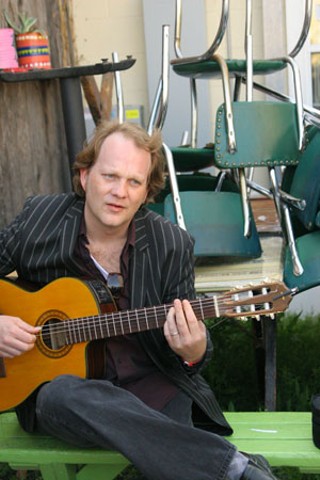
"Surfing was an Anglo kind of thing. Very racist in a way. And in the Chicano culture, you were abandoning your culture by wanting to be a surfer.
"So I was stuck in this kind of no-man's-land. They used to think I was Hawaiian as a surfer, right? I would go for it so I wouldn't get my ass kicked. So I was Hawaiian for the day or whatever it took to get out of some hairy situation. It's an interesting thing; I've always wanted to write a whole thing about that."
I'm not sure he's done it here, either, but it's an important point, because the distanced eye of a troubled outsider can be felt in several of the lyrics, like "Smoke," which is set in Rodney Bingenheimer's English Disco, the Sunset Strip nightclub frequented by very young Anglophile teenagers; "Swallows"; and the forlorn barfly lover in "Hollywood Hills."
The music's about inclusion, the way rock & roll always is, even when the words complain about being excluded. Escovedo describes the Nuns, his first band (he was 24, a late bloomer in every way), as the product of crashing film courses in San Francisco.
"We just wanted to make this film, based on the Stooges in a loose way, like Iggy's song 'The Dum Dum Boys.' It's about these misfits who can't really play. Since we couldn't play, we thought we'd play ourselves because we kind of looked cool. So we became the band, and the movie was never finished. We became the Nuns. That was the beginning of my musical career, really. We rented a guitar from a music store.
"We were horrible people," he adds. "We were despicable."
He's kidding (he's not kidding).
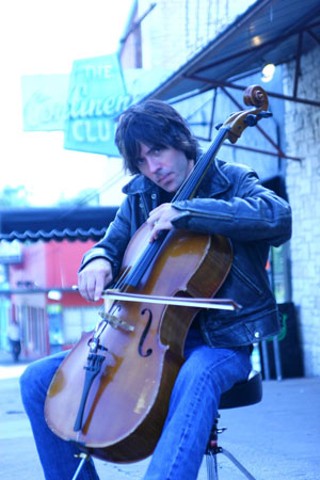
"It's one of those things where we never should have been a band. The singer had never been in a band, didn't even really listen to records other than Stones records. His girlfriend loved Mick Jagger, so he had to emulate Mick Jagger. We did everything wrong. We had two lead singers, and then a keyboard player who was also a singer. Her thing was so different from the rest of the band. She was our Nico. She did this very Germanic, all-dolled-up kinda thing.
"We were just complete misfits."
Yet from the time they first played Mabuhay Gardens, with a band led by Chip and Tony Kinman of Rank and File as the other act on the bill, the Nuns helped define the San Francisco version of punk. The city's eclecticism was what made that scene different from New York's or London's or the one in L.A.
"San Francisco had such a bohemian atmosphere. We'd go around North Beach and hand out free tickets to the Cockettes – what was left of them – the Angels of Light, and you know, Bruce Conner and all the people who hung out at City Lights bookstore. So it was a slightly older crowd, a totally different trip. We brought in all kinds of things. It was a multimedia circus in San Francisco."
That's an insider speaking. Directly afterward, the outsider shows up.
"The Nuns could never find a gig, because San Francisco was pretty much run by Bill Graham. So for bands like us to play, you had to find your own gig ... or find somebody who was crazy enough to let you play in a bar.
"We got a gig on Fisherman's Wharf. It was one of those things where they had the speakers out on the street to lure the tourists in. As soon as we plugged in and cranked it up, within half a song they threw us out of the bar. We had lost our gig right away. So we went back to our rehearsal studio on Folsom Street and put up a sign: 'If you came to see the Nuns, we're at so-and-so address on Folsom.' The only two people that showed up were Chip and Tony, who had come to see us. So they came to our rehearsal, and we performed for them. We did our full set for our girlfriends and Chip and Tony."
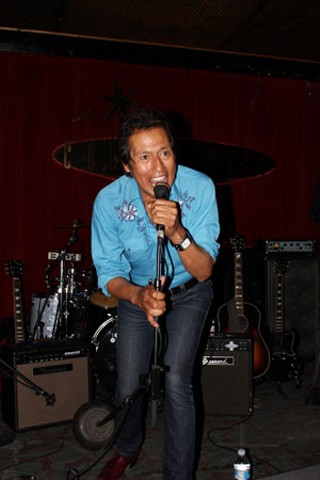
Back to the insider again. Except that he then says the Nuns are still a band, only "now they're supposed to be vampires."
On Real Animal, "Nuns Song" and "Chip n' Tony" have very little to do with each other, except that both are among the album's more belligerent songs. (The title track, by far the most antagonistic, wouldn't have been out of place in Buick MacKane's set list.) Why "Chip n' Tony" is set this way is interesting, since that pounding beat is exactly what Rank and File reacted to. They stepped outside of punk, keeping the attitude but not the beat. From this outsider move came alt.country, which is, let's face it, one long insider story.
Even here the stories tumble together, much the way Escovedo's musical interests haven't so much blended as converged. "Chelsea Hotel '78" describes living in the New York landmark, where he moved just after the Nuns had opened for the Sex Pistols' final show at Winterland in San Francisco. 1978. It was punk time.
"We came to New York, we lived in the Chelsea, and we toured the East Coast by Amtrak. We were on $5 per diem back then. I remember the day that I came down to the lobby and Sid was checking in, him and Nancy, with Jerry Nolan and Johnny Thunders [of the New York Dolls] in tow."
The change came when Chip Kinman moved to New York, too, and he and Escovedo decided to do a country-punk band. Rank and File belonged in New York about as much as an orange grove.
"It was the worst. We used to put ads in the paper looking for a country western drummer, and we'd get guys who'd say, 'Yeah, I love the Riders of the Purple Sage.'"
They landed a tour: seven gigs in seven weeks. On the night Ronald Reagan was elected president in 1980, they left for Dayton, Ohio, with $25, a bag of pot, and a roast chicken. All of it was gone when they reached the first show. Eventually, they made Austin, which was filled with people they didn't know, except for Lester Bangs, who had moved there because he had friends, or a friend, in writer Ed Ward.
"We played at Raul's; it was still open. The Armadillo had just closed. And I just fell in love," smiles Escovedo. "I remember calling New York and saying, 'I wanna move here.'
"Everyone was just so friendly, and the food was so great, and the musicians ... I mean, suddenly I see Townes [Van Zandt] in person for the first time. Blaze Foley is there, Pat Mears, Jubal Clark – all these great songwriters, man."
He hadn't written a song yet, but songwriters were already a passion.
Leaving Austin, Rank and File finally made it to its last few dates, which were in the Pacific Northwest. Along the way, they picked up Tony Kinman. Chip on his own was one thing. Chip and Tony together were another. On the drive back, the rhythm section quit. Escovedo and the Kinmans reconstituted the band back in New York and stayed just long enough to be able to afford the move to Austin, where they lasted a year or so, just long enough to permanently embed Escovedo as part of the city's music culture.
This account untangles the story in a way that does no justice at all to the flow of Real Animal, which is a narrative of something else: of perseverance, commitment, faith, perhaps even aging wisely.
"The first solo album, [1992's] Gravity, is really the Austin experience. That and Thirteen Years," he says. "With this record, I really wanted to get away from those things. I didn't want to address the things that I had on The Boxing Mirror. I'm done as far as that's concerned."
2006's The Boxing Mirror, produced by another one of his heroes, John Cale, is a journal from a dark night, the period when Escovedo's father died and when he faced death himself as a result of hepatitis C. During this period, benefits were held and Por Vida, a tribute album, appeared, all the kinds of things that usually happen when a beloved musician is dying.
Then Escovedo found a hepatitis treatment that worked. Today, he looks great, with that shining, high-cheekboned face, the brilliant child's smile, and the pomaded hair slicked back, clothes always chosen to fit perfectly, and sometimes, amazing shoes. (The current pair is very red and very pointed.) To see him, you wouldn't guess he has seven children, the oldest almost 40, the youngest under 10, let alone that he was sick unto death not long ago.
At the Continental Club, on the Sunday night of South by Southwest 2008, where he performed the whole show without ever touching his usual quartet of guitars, he was in command of his material in a new way. The energy level remained as ever in the red, but the attitude behind it demonstrated a different confidence. He introduced "Slow Down," the first song he and Prophet wrote, which wound up as the last track on Real Animal, by talking about what it means to get older. To get old, even. Losing one's father does that.
"That was huge. You know how you think you're prepared for all these things? I was not prepared," he says. "[The Boxing Mirror] is a really beautiful album, a dark album, somewhat dark. Not in a downer way, but it addresses some serious things, you know. With this album, I just wanted to tell a story. I wanted it to be like a movie."
Real Animal tells the story he has to tell: His own. A story so old it always seems new, because it is, as James Baldwin wrote, "the only light we have in all this darkness." Looking back, the pain of it never outweighs the pleasure. The Nuns may have been crazy enough to turn into vampires, but Alejandro Escovedo not only survived the experience, he got a great song out of it. The Chelsea may have been the place punk rock went to die, but it was also where you could meet up with Neon Leon, who was busy prefiguring Prince. Ronnie Lane may have had his life wrecked by a horrible illness, but Alejandro Escovedo, who once faced a similar horror, has just made his finest album and looks fit enough for many more.
"If you asked me what my music is like, I really couldn't answer that in one sentence. I couldn't give you a sound bite," he insists. "Because it's about so many things. It's about my brother's bands, the larger bands, and the arrangements of Duke Ellington, which somehow seeped into all the stuff that I was doing. Then you take 'Sleepwalk' by Santo & Johnny, and Brian Eno, Mott the Hoople, and Ian Hunter's songwriting. You take all those things and throw them into one thing, and somehow you come up with what we've tried to create over the years."
"Slow Down," the first which is last, begins with an incredible scene. The singer walks the beach holding hands with his new love, out on the strand. On the pier, a band plays. "Close your eyes, and you can hear the music in the wind," he tells her. "Out on the pier, that's the Ike and Tina Turner Soul Revue. I don't know what this means to you, but it was everything to me."
I know this is his story. It's also mine, though somehow, in my version, it might easily be the Alejandro Escovedo Orchestra up there. The image is indelible. It does slow you down, the way anything does when it takes your breath away. It's a gift, and like most gifts, it both makes no sense and makes perfect sense. And the person who gives it is always a friend.
Alejandro Escovedo's wrecking crew celebrates Real Animal two nights at the Continental Club, Thursday & Friday, June 26 & 27, with a Waterloo in-store performance preceding the Thursday performance at 5pm. Look also for Escovedo & Co. at the Keep Austin Weird 5K on Saturday, June 28, at Auditorium Shores. www.keepaustinweird5k.com.






